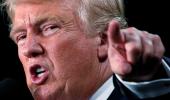The world is still figuring out the man as he continues his enigmatic journey towards the first 100 days of the US presidency.
But with emerging trends of realism and flexibility even his enemies have begun to see the logic in some of his actions, says Ambassador T P Sreenivasan.
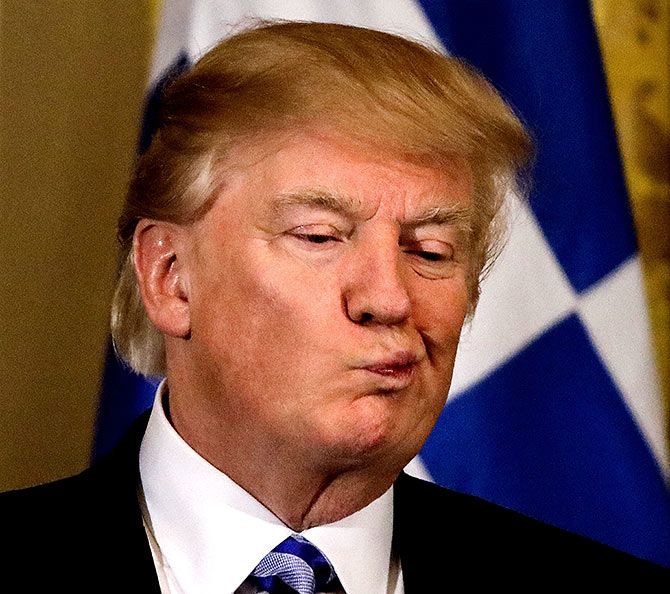
Photograph: Carlos Barria/Reuters
'Arguably the best week for Donald Trump's still young presidency from a successful strike in Syria to confirmation of his supreme court nominee' tweeted Richard Haass, President, Council on Foreign Relations and author of A World in Disarray on April 3.
Such acknowledgments of the United States president's success have been few and far between, as he continues his enigmatic journey towards the first 100 days of his presidency.
The world is still figuring out the man.
By ordering the bombing in Syria after an emotional reaction to the gas attack after repeatedly asserting that he would not intervene and maintaining his hope of a grand coalition with Russia, President Trump has revealed a silver lining of rare flexibility.
He was compared earlier to Shakespeare's Richard III; President Thomas N Tucker (TNT), the hero of a forgotten bestseller by Christopher Buckley The White House Mess; and a bull in a china shop. But as the days drag on, he appears more like Hamlet, with a method in his madness or the prophet lunatic of Kerala, Naranath Bhranthan (Madman of Naranam) who was a seeker of truth, but behaved erratically to convey some worldly wisdom.
Even his enemies have begun to see the logic in some of his actions, giving him the benefit of doubt.
Steven Schier, a presidential scholar, has observed that the idea that the president is off on an unprecedented dictatorial path is inaccurate. There is no evidence that he has gone further than his predecessors, including President Obama, in issuing executive orders.
Moreover, he has modified some of them to meet judicial objections and submitted them for the required Congressional approval.
Most elected political leaders begin with a honeymoon with their people even after contentious elections. Their supporters applaud their actions as they proceed to implement their election promises, while their opponents allow time before agitating for their demands.
But in Trump's case, the agitation and protests began the day he took over, not for violating his promises, but for fulfilling them.
This is the first time in history that someone is elected in the hope that he will not live up to his promises.
Even the party that nominated him did not feel obliged to support him, even in the early days. But within a month, Trump is seen in a new light as the checks and balances of the system have begun to operate and Trump himself has begun to understand the limits of the powers of the president.
The focus is shifting from his follies and idiosyncrasies to some signs of flexibility and realism.
German Chancellor Angela Merkel had some awkward moments in the White House during her first encounter with Trump, but considering the prevailing uncertainties about US policies towards NATO and refugees, the meeting marked a thaw.
In fact, the beeline to the White House has followed the traditional pattern, beginning with close allies like British Prime Minister Theresa May, Shinzo Abe of Japan, Justin Trudeau of Canada and Benjamin Netanyahu of Israel -- and not President Putin of Russia, as some had suspected.
Of course, much was made of the spelling mistakes in the White House communications relating to May, which were attributed to Trump himself and the oddity of the handshake with Abe.
But the substance of the conversations was on expected lines without any fireworks even with Trudeau, who had challenged Trump's refugee policy and volunteered to hire the IT workers discarded by the US.
Predictably, he met President Xi Jinping of China against the backdrop of tensions between the Koreas.
Though he said he had not gotten anything from the meeting as yet, there were no surprises in protocol or substance. Trump has also made amends for his phone call with Taiwan's president and restored the 'One China' policy without batting an eyelid.
He may have chided Australian Prime Minister Malcolm Turnbull , but the calls made to others, including the leaders of India and Pakistan, were impeccable politically. A visit by Prime Minister Narendra Modi also appears to be on the cards.
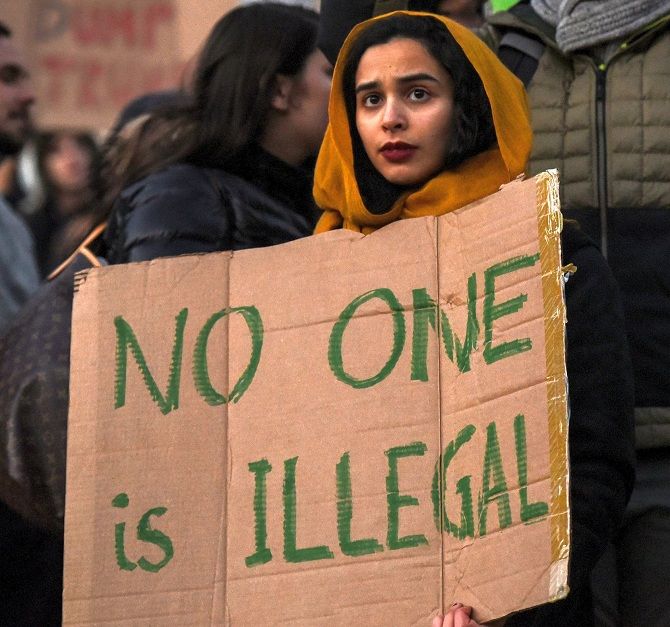
In a sobering lesson to Trump, the judiciary put its foot down and prevented overzealous implementation of the order.
Photograph: Stephanie Keith/Reuters
The so-called Muslim ban was the most controversial of the executive orders issued by the new president, though it was limited to six Muslim countries.
Fortunately, the judiciary put its foot down once again and prevented overzealous implementation of the order.
The general antipathy towards refugees and visitors from Islamic countries provoked a serious challenge to the image of the US, but the status quo remains because of judicial intervention.
The lesson not to overreach may have sobered Trump and also given him an alibi not to go for the drastic promises he made. The Statue of Liberty still remains intact, without being re-exported to France.
Many seem to have forgotten that Hillary Clinton had also announced that she would withdraw from the Trans-Pacific partnership, one of Obama's pet projects. But action by Trump to exit TPP soon after assumption of office had a shocking impact.
The general assessment of the US exit from TPP is that this will give China a free hand to dominate the Asia Pacific. But the reaction of other TPP members do not indicate that China will be the winner in the bargain. TPP members are looking for alternatives rather than a rush to China to get it into the partnership.
Trump has given no indication that Obama's Asia pivot is a thing of the past. He has committed to have separate trade agreements with the countries in the region.
China's initiatives to counter TPP, such as the Free Trade Area of the Asia Pacific, have not gained popularity because of the US action.
Since there is no permanent US exit from Asia, the TPP action does not seem to have elevated China to hegemonic power.
In fact, India and Japan seem to have gained as a result. India will get greater access to the US market and Japan will work out its own alternative to TPP.
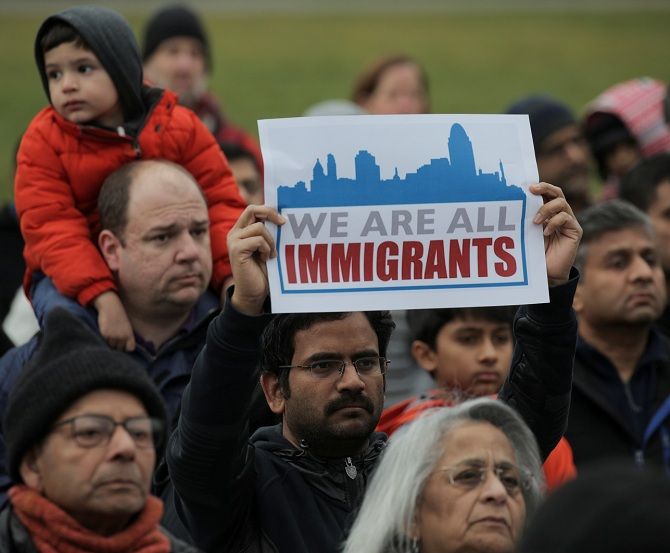
The H1-B visa issue was considered the litmus test of Trump's friendship for India and there was expectation he would go slow on this subject. But this was one of the issues which Trump took up at the very beginning of his presidency.
Trump began by saying that he would investigate any misuse of the visa, but the intention was to reduce the number of visas in this category so that the jobs can go to local people. This was ambitious because it was known that it would take more than seven to nine years to replace all the Indian IT workers.
The methodology he used was to double the minimum salary required for a foreigner to qualify for the H-1B visa. This would make it unattractive for companies to hire foreign workers.
The uncertainty created by the order would be like a Damocles' sword over the heads of many IT companies. But an important point to remember is that even Obama was not too liberal with visas and outsourcing.
This is a populist measure, which will be moderated when the IT companies up the ante and the IT industry faces losses.
Modi may also make this a bargaining point at his first meeting with Trump. India has already warned that Trump should be analyzed, not demonised.
US national security adviser Michael Flynn's exit reflects an expected reversal of Trump's policy of friendship and cooperation with Russia.
The cold warriors on both sides would never have allowed a game changing policy on Russia. Flynn's resignation on account of an unauthorised conversation with the Russian ambassador on the possible relaxation of sanctions against Russia shows that the Cold War is alive and well and Trump cannot move the Russian agenda too far.
The international ramifications of a US-Russia rapprochement can rest at least for the present.
The method in his madness will not permit him to pursue his announced policy despite Rex Tillerson's appointment as the US secretary of state. Flynn's fate will be an advance warning for Tillerson.
Trump was much more realistic on Russia than ever before at his press conference, wondering whether it would be possible at all to strike a deal with Russia.
'I would like to be able to get along with Russia,' he said. He also vowed that he had no contacts with Putin except for the calls the Russian leader made to congratulate him on his victory and on his inauguration.
Flynn's exit also turned out to be a blessing in disguise as the president now has a more balanced and reputed national security adviser in H R McMaster.
The action in Syria has made the chasm between the US and Russia wider.
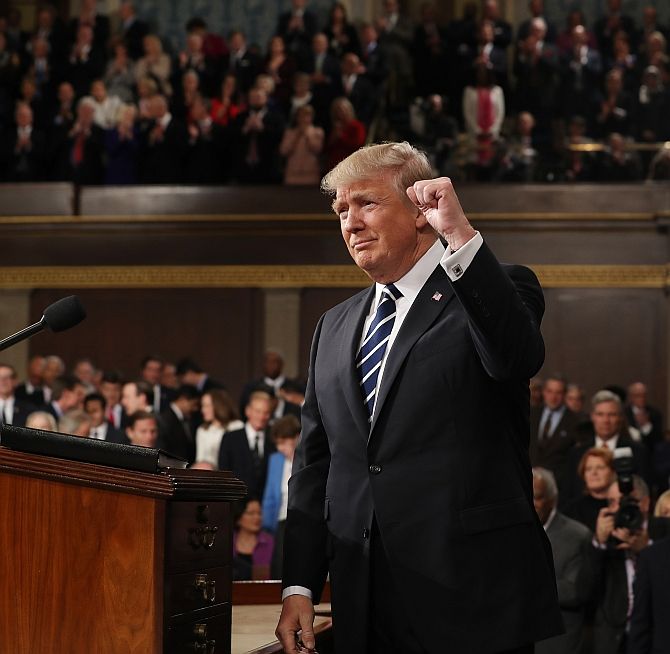
In the case of Israel, the expectation was that America's closest ally would be free to do whatever it wished to do under Trump. But the very issue on which Obama tried to undercut Trump by allowing a UN Security Council resolution has become a point of convergence between Trump and Obama.
Trump warned Israel that its settlements on Palestinian territories may not lead to peace. More recently, on the eve of a crucial meeting between Trump and Netanyahu, the White House said America can only lend a helping hand in resolving the decades-long conflict, but it cannot dictate the terms of peace.
'Peace is the goal, whether it comes in the form of a two State solution if that's what the parties want or something else, if that's what the parties want, we're going to help them,' the White House said.
It was also clarified that the US was not abandoning the two State solution. At least, it is not for Israel to call all the shots.
The coming of age of Trump, signified by such symptoms, may well be wishful thinking at best or illusion at worst. But his method rather than his madness was evident in his first address to the US Congress.
He was cogent, coherent and subdued in his presentation, even though his tough policies on immigration, trade, national security, the wall and others remained intact.
The Republicans appeared to have come to terms with him as evidenced by the enthusiasm shown by US House of Representatives Speaker Paul Ryan.
A streak of humaneness was visible in the president's reference to the hate crimes, particularly against an Indian in Kansas.
The threat of impeachment appears to recede as Trump approaches his first 100 days in office.
T P Sreenivasan, (IFS 1967) former Ambassador of India and Governor for India of the IAEA, is Chairman, Academic Council and Director, NSS Academy of Civil Services, Director General, Kerala International Centre.
Please scroll down for more insights into Trump's presidency.
